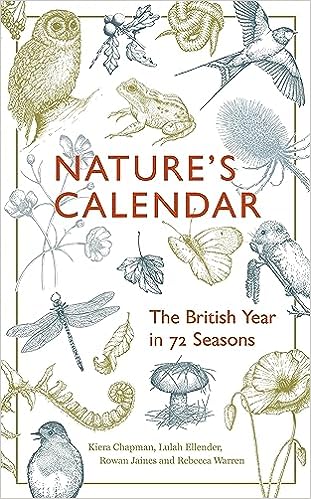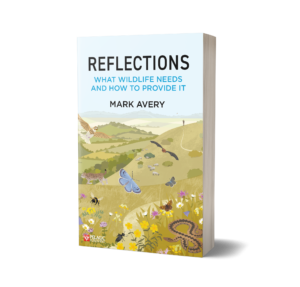
This book takes the Japanese view of many mini-seasons of a few days and fits it to the natural rhythms of UK wildlife. It’s close to an approach tried before by Lev Parikian (Light Rains Sometimes Fall – reviewed here) but in my view, it’s done even more successfully here.
The four authors took the 72 mini-seasons from Japan and asked the world, through social media, what we all associated with that time of year. The result is a pleasing collection of natural events that mark out the year in the UK. Some resonate strongly with me, for example ’11-15 March Chiffchaffs Return’ which is very much when I expect to hear this warbler in my environs. Fifty years ago, it was about two weeks later which I remember because it was close to my birthday. But others, chosen by the public, mean much less to me, although some of these provided the subjects for the most interesting essays. The four authors’ accounts are scattered through the book but one begins to recognise the style of each as one reads through the pages. The illustrations are lovely and by Rebecca Warren.
Another author, or another four authors, would have chosen different subjects but that’s part of the fun of the book – you can’t be sure what will come next (unless you cheat and look at the contents page first). There aren’t really any marine or coastal examples and surprisingly few mammalian ones. Birds are well-represented and flowering plants get a very generous representation. There are lots of insects.
In the first half of the year you’ll be taken through to the solstice by catkins, snowdrops, aconites, daffodils, frogspawn, butterflies, blackthorn, Swifts, Hawthorn and 19 other natural events – that gives you a flavour of them.
I wonder how much the Japanese really use these 72 poetic seasons? I’d like to know. How many of the 125+ million population across c2,400 miles of archipelago (cf 800+ for the UK) are on the same page, in the same season, in these very short seasons? Are they all really saying that ‘Dew glistens white on grass’ between 8th and 12th September anymore than we are all saying ‘Arachnids assemble’? To be fair, I have noticed the dew in the last few mornings (though I’m not in Japan), and my eye has been drawn to spiders in the garden too – sometimes because their webs are be-dew-elled – there must be something in this. But in this book it is a good device for some very engaging nature writing.
Each of our traditional 12 calendar months has a ‘Noticing exercise’ – a suggestion of something to consider in the month ahead to sharpen and deepen your attention to nature and its changes. Next month you might try preserving autumn leaves.
I liked this book very much and I will try to dip into it to check on the season for the next 12 months and 72 seasons Japanese-style. When I do, I think I’ll be very open to repeating the process in the next year and onwards.
The cover? Very nice, and fitting too. I’d give it 8/10.
Nature’s Calendar: the British year in 72 seasons by Kiera Chapman, Lulah Ellender, Rowan Jaines and Rebecca Warren is published by Granta.

Signed copies of my most recent book book, Reflections, are available from me.
Contact me at mark@markavery.info
Softback – £20 (incl UK P&P)
Hardback £26 (incl UK P&P)
[registration_form]
As I haven’t read the book I don’t know for sure what exactly ‘arachnids assemble’ is referring to but it is certainly my experience that around this time of year the garden orb-web spiders, Araneus diadematus, suddenly become much more conspicuous. Where small individuals have been encountered intermittently through the summer, there are now large webs stretching across garden paths and between bushes, seemingly everywhere, each with a lovely fat spider perched in the middle.
Enjoyable review. As a long-term resident of Japan (and also one of the proofreaders of the book!), I can answer your question about the frequency of use of the 72 seasons. If you’re of a certain age (I’m 51), you’ll remember calendars with days labelled as Epiphany, Pentecost and even Sexagesima (the second Sunday before Lent). Educated and older people will be familiar with the dates, but they don’t mean much to most people. Similarly, more mature Japanese people will be know of the 72 seasons (which actually originated from China, as do many things that the Japanese claim to be their own), and a weather forecaster will occasionally introduce their forecast with something like ‘tomorrow is the first day of the season of big snow’ to add a bit of interest. That’s about it really.